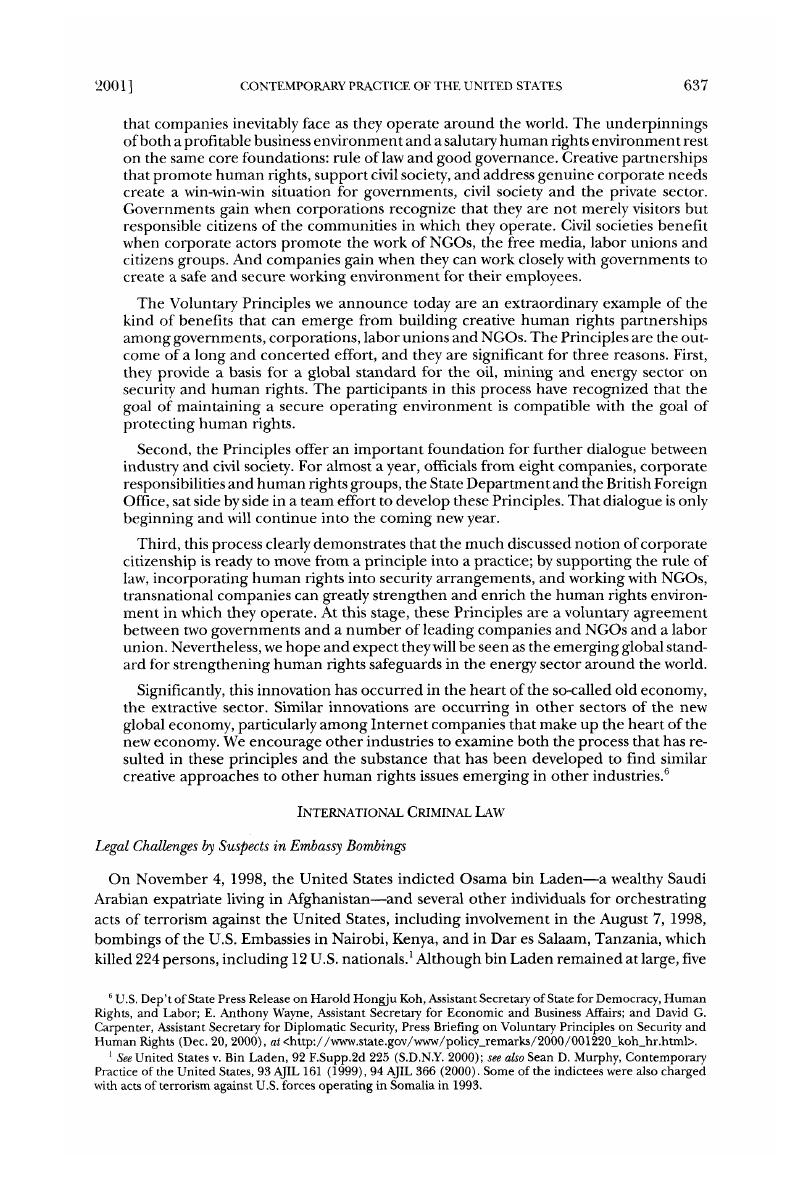No CrossRef data available.
Published online by Cambridge University Press: 06 June 2017

1 See United States v. Bin Laden, 92 F.Supp.2d 225 (S.D.N.Y. 2000); see also Murphy, D. Sean D., Contemporary Practice of the United States, 93 AJIL 161 (1999)Google Scholar, 94 AJIL 366 (2000). Some of the indictees were also charged with acts of terrorism against U.S. forces operating in Somalia in 1993.
2 By the end of 2000, 21 persons were indicted in New York for the embassy bombings. Five were in custody in New York, 3 were in custody in the United Kingdom awaiting extradition, and 13, including Bin Laden, remained at large. See Eggen, Dan & Vise, David A., More Indicted in Embassy Attacks, Wash. Post, Dec. 21, 2000, at A15 Google Scholar.
3 United States v. Bin Laden, 126 F.Supp.2d 264, 269 (S.D.N.Y. 2000).
4 Id. at 270.
5 Id.
6 354 U.S. 1 (1957).
7 389 U.S. 258(1967).
8 299 U.S. 304 (1936).
9126 F.Supp.2d at 273.
10 The Foreign Intelligence Surveillance Act of 1978, 50 U.S.C. §§1801-1829 (1994 & Supp. V 1999), regulates incidents in the United States involving foreign intelligence collection, but does not address the United States’ foreign intelligence collection overseas.
11 126 F.Supp.2d at 273-74 (citing United States v. Truong Dinh Hung, 629 F.2d 908, 913 (4th Cir. 1980); United States v. United States Dist. Court (Keith), 407 U.S. 297, 315 (1972)).
12 126 F.Supp.2d at 275.
13 Id. at 274-77.
14 Id. at 277.
15 Id.
16 The court found that the electronic surveillance that preceded this date was unlawful, but found that exclusion of the evidence would be inappropriate “because it would not have the deterrent effect which the exclusionary rule requires and because the surveillance was undertaken in good faith.” Id. at 282.
17 See Miranda v. Arizona, 384 U.S. 436 (1966).
18 United States v. Bin Laden, 2001 WL 30061 at *3 (S.D.N.Y.).
19 Id.
20 428 U.S. 153 (1976).
21 United States v. Bin Laden, 126 F.Supp.2d 290, 294 (S.D.N.Y. 2001).
22 Id. at 294-95.
23 Apr. 24, 1963, 21 UST 77, 596 UNTS 261.
24 126 F.Supp.2d at 295-96. For a similar outcome in the case of one of the other defendants, a Saudi national, see United States v. Bin Laden, 132 F.Supp.2d 168, 194-97 (S.D.N.Y. 2001).
25 United States v. Bin Laden, 132 F.Supp.2d 168, 181.
26 Id.
27 Id. at 181-82 (citing United States v. Verdugo-Urquidez, 494 U.S. 259 (1990)). In Verdugo-Urquidez, the Supreme Court held that the Fourth Amendment did not apply to the search and seizure by U.S. agents of property owned by a nonresident alien and located abroad. The Court stated in dicta, however, that the Fourth Amendment operates differently than the Fifth Amendment. “The privilege against self-incrimination guaranteed by the Fifth Amendment is a fundamental trial right of criminal defendants. Although conduct by law enforcement officials prior to trial may ultimately impair that right, a constitutional violation occurs only at trial.” 494 U.S. at 264.
28 132 F.Supp.2d at 181. The court’s conclusion may be contrasted with a recent case in the federal district court of Massachusetts. In United States v. Raven, 103 F.Supp.2d 38 (2000), a Dutch citizen was arrested and charged with attempting to smuggle heroin into the United States. While in custody in Belgium, he made statements to U.S. and Belgian officials regarding the crime, without his Belgian counsel present. After transfer to the United States for trial, he sought to suppress the statements, arguing that his right to counsel under the Fifth and Sixth Amendments was violated. The court in this case ruled that foreign nationals do not benefit from the protections of the U.S. Constitution. Citing Johnson v. Eisentrager, 339 U.S. 763 (1950) and Verdugo-Urquidez, the court said that the Supreme Court’s refusal to grant Fourth and Fifth Amendment rights to aliens in those cases suggested that it would also refuse to grant Sixth Amendment rights. Noting that the U.S. officials complied with the laws of Belgium in questioning the defendant, the court denied the motion to suppress.
29 132 F.Supp.2d at 189-94. For a similar outcome with respect to another defendant, Mohamed Sadeek Odeh, see United States v. Bin Laden, 132 F.Supp.2d 198 (S.D.N.Y. 2001).
30 See Weiser, Benjamin, 4 Guilty in Terror Bombings of 2 U.S. Embassies in Africa; Jury to Weigh 2 Executions, N.Y. Times, May 30, 2001, at A1.Google Scholar
31 See Lynch, Colum & Haughney, Christine, Jury Rejects Death for Embassy Bomber, Wash. Post, June 13, 2001, at A1 Google Scholar; Weiser, Benjamin, Another Convicted Terrorist Is Spared Death Penalty in Bombings, N.Y. Times, July 11, 2001, at A17 Google Scholar.